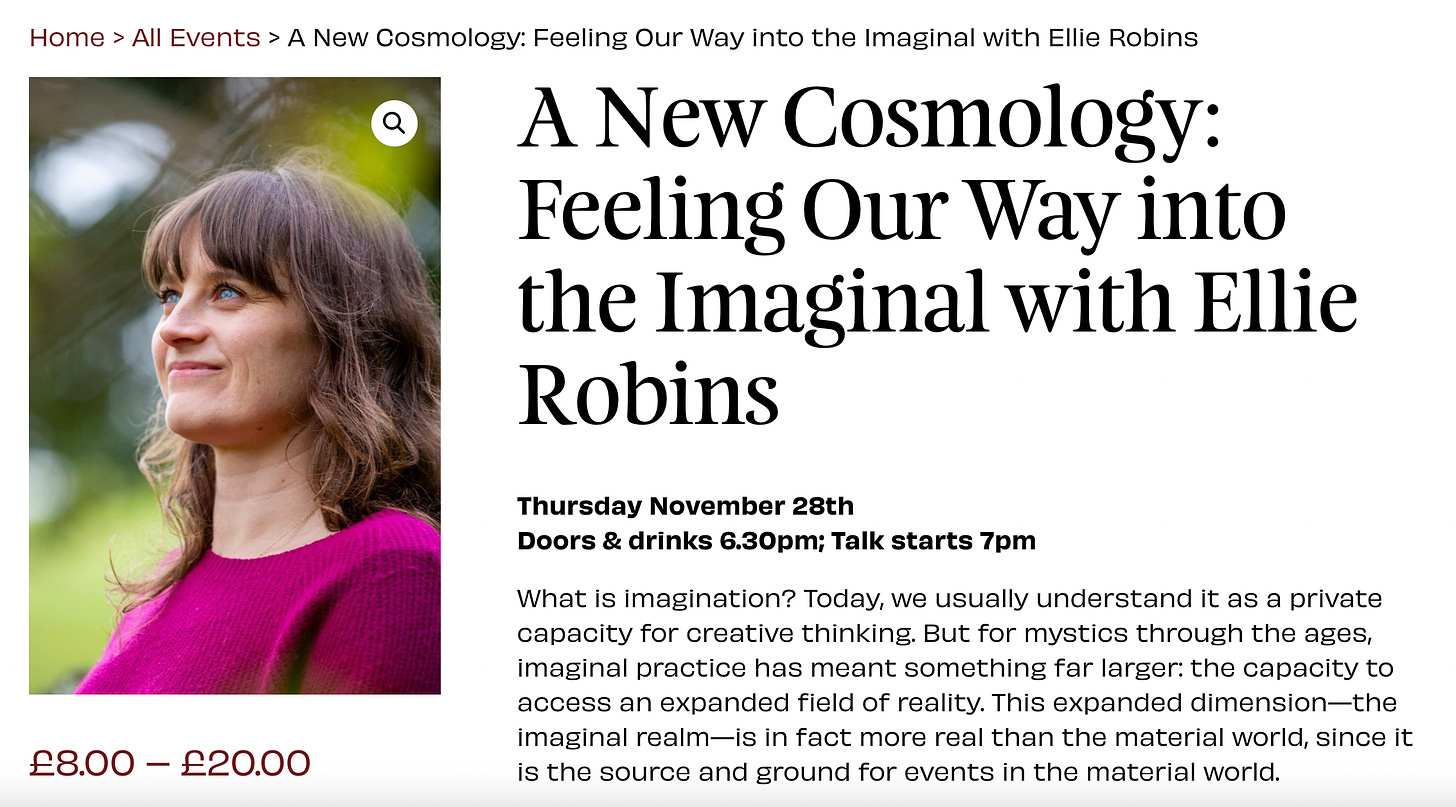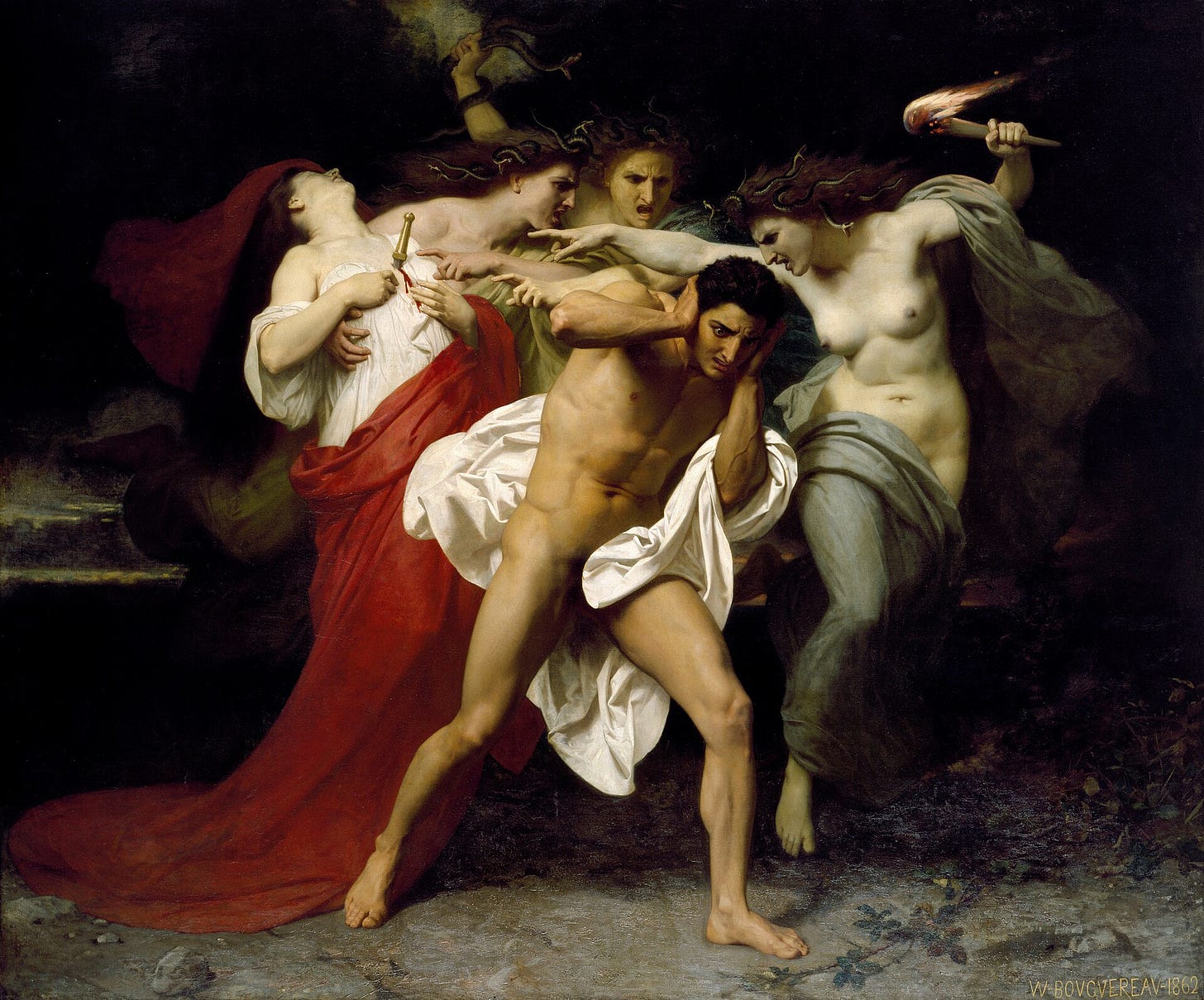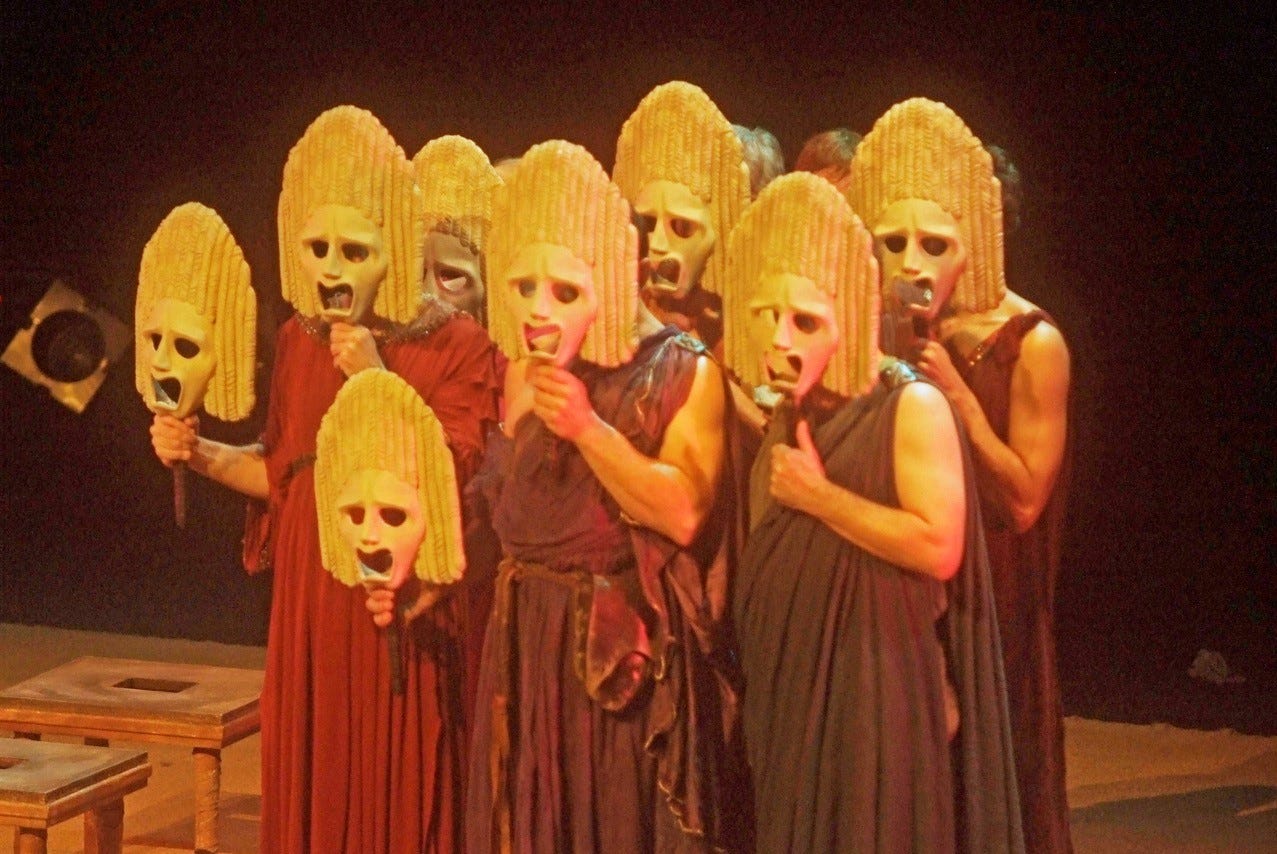Democracy was founded on the legal suppression of grief, and why politics without art is death
Let's go to Ancient Athens
Before we zoom back to the sixth century BCE, two things I’d like to share:
If you like this Substack and its themes of imagination; the expanded reality that’s accessible through imagination; and how we in the modern West can regain our access to that more expansive, soulful reality—do I have an event for you. Come along to my talk at Kairos in London on Thursday 28th November to hear me talk about these things, but more importantly, so that we can feel our way together into the life-giving, whole-making field that is the imaginal realm. There’ll be dinner and a chance to chat too. And I so want to meet some of you!
A very brilliant and sexy new magazine was launched last week. Hurry Up We’re Dreaming investigates the idea that technology might just be a portal for spirit. I’ve got a piece in the first issue—a Q&A I conducted with Hildegard of Bingen, on how to attune to divine wisdom and receive the ideas that count. She was quite hard to get hold of, across 900 years of history, but I persisted and I think the effort paid off. Read the whole first issue here; it’s a great read!
Hello, friends,
Apropos of, oh, nothing at all, I want to tell you a story about the origins of democracy. It’s a story that unfolds in Ancient Athens, about the legal suppression of elemental female grief and rage, about the birth of theatre, and about an experiment in governance that was never, ever intended to function without art at its beating heart.
Which means that it’s a story about why things are so grindingly difficult today and why we live in such dysfunction at every goddamn level. Because of course, we have taken that experiment in governance and stripped from it the life and the soul and the art that its Athenian originators knew were the only way it could ever work. Because in this as in all else, we have forgotten beyond all recall that life depends on maintaining your Double Vision, your ability to perceive that everything—everything, from your lover to your nation state—is both temporal and eternal. A body made of bones and blood, and an everlasting soul. A set of laws, and the art the soul must absorb, must dwell in, must make, in order to have any hope of applying those laws wisely and justly.
I don’t need to tell you this, but we’ve taken the breath and the soul out of everything, and now all that’s left is bones and backs getting cracked and crushed under unjust laws. Bring back the soul. Bring back the art. I’d say it’s a matter of life and death, but it’s bigger than that. It’s a mythic battle.
So here’s what it looked like, way back when, in the days when art and the gods still breathed in the polis.
***
Here are fifteen thousand men, sitting in the sun. At their centre, a stage, where a chorus and actors play out the local myths, reimagined to illuminate the pressing questions of the day: What is virtue? Is true justice possible? What is the extent of human power? What is the nature of divine will? And on.
We are in Athens, around the turn of the fifth century BCE, watching one of the world’s first drama contests. How did this come to pass? Why do we now find humans beginning to enact, to act in, to stage their mythic stories, rather than recounting them as narratives in a single voice? We can’t really know, though we do know that the first drama contests seem to have emerged out of the centuries-old festivals worshipping Dionysus, and that they might have taken inspiration from the rites of mystery cults like the Eleusinian Mysteries, held every year in worship of Demeter and Persephone.
But I digress. The point is, look! A stage! And the first plays. And such a large audience. Why such a large audience? Well, partly because this new artform, this thing we know as theatre, has arisen in tandem with a great experiment in human governance: democracy. Not only arisen in tandem, in fact: it is an instrumental part of the democratic process.
Professor Geoffrey Bakewell writes: “For almost 200 years, the city’s most important decisions were taken by majority votes of large groups of citizen volunteers who had little or no formal education, were mainly poor, and were often illiterate.” And how, exactly, were such citizen volunteers expected to navigate the complexities of democratic decision-making? Through the soul-expanding, morally and intellectually and spiritually formative experience of theatre. Watching theatre was the ideal training for participation in democracy, because, in Bakewell’s words, “each spectator had to think for himself, deciding what was wrong and what was right and what exactly had led to each play’s disaster.”
And it didn’t stop at spectating. It was citizens themselves who would act in these plays, taking on the named roles but more importantly, more formatively, playing in the chorus.
Being a member of the chorus was an unpaid role, undertaken by ordinary citizens, and because the chorus must move in careful synchrony, collectively embody potent energies, and deliver the moral voice of the play, it required a lot of training. This training was recognized as a form of paideia—or rounded education of the ideal citizen, including their soul—because it brought down to the bodily level the practices of unity of action and moral discernment while riding powerful energies. James H. Collins writes, “Moral action requires neither the priority of reason nor an appeal to moral principles. It requires instead that a person have the sensitivity and disposition that a situation demands.” And this sensitivity and disposition were acquired by “engaging in routines and ceremony with others and with the right feeling of awe”.
So we can see that in the Athenian experiment in democracy that paved the way for our current political system, art wasn’t just an afterthought, a nice-to-have, a let’s-maybe-throw-some-funding-that-way-when-we’re-done-buying-weapons. It was inextricably a part of the democratic process. It was known that a city-state guided by the popular will could only hope to function if the popular will was swimming at all times in humanity’s highest achievement and expression: art.
Can you imagine? If training to be part of a Greek chorus were part of the formation of a citizen today? Fuck, can you imagine if it were part of the training of our politicians? How much better might life be if our elected rulers had to learn to dance together while channelling ferocious energies, or if they were having their souls forged in fire every night watching and playing in the tragedies of Sophocles and Aeschylus and Euripides? How might our elections differ if in the weeks before them, the popular media plunged us into the great Greek theatre, into people being torn asunder by the gods and by their earthly fates and by the blazing question of how, how to navigate both, instead of this useless, soul-sucking horserace bullshit?
Humanity is in a portal right now, no doubt about it, and whatever happens on November 5th will direct our movement through it for a long time to come. But no matter what happens on November 5th, there is so much else to be done. The real work was always meant to happen between elections; it was always about feeding our Double Vision, about breathing soul into the polis, so that we can act wisely and justly and out of our most expansive humanity when critical decisions need to be made.
Bring back the soul. Bring back the art. It was never adornment or entertainment. Without it, we die.
***
My head is telling me to stop writing this piece here—that that’s enough of an idea for today. But look, I can’t write this and not tell you this next thing. Because although from where I sit, a democracy with theatre, with art more broadly at its beating heart sounds like heaven—even this model was already a compromise, a repression, a white-knuckling that might always have been doomed to failure. Because it already relied upon the legal suppression of the female voice, and specifically the raw grief and rage that voice had long been known to carry.
Let’s rewind a few decades further, to the sixth century BCE, when the Athenian statesman Solon was already engaged in statecraft—was trying to build an early version of the city-state that would emerge a little later. Part of his project—a core way in which he created the conditions for a governable state—was to outlaw lament.
Lament was a ritual carried out at funerals and following deaths, by women only. It was a wild song, the voice of rending grief, often featuring ululation and other primal sounds. I want to share a clip with you, but (perhaps predictably since this has always been a female rite, and since it’s been suppressed through the years), the kind I’m looking for is thin on the ground. I’m lucky enough to have taken a lament workshop with the incredible choir leader Eleanor Holliday, singing reconstructed versions of ancient laments and also some more recent folk laments, and I can tell you that something pitch-black and blood-red and vital moved through me. The closest clip I can find to the songs we sang that day is this Bulgarian women’s folk lament—a much later song (which I don’t actually understand because I have zero Bulgarian), but with a little of the same energy. Though less ululation.
In any case: back in Athens in the sixth century BCE, deaths had been marked and mourned since time immemorial by this outpouring of elemental female grief. Here’s how it looked: the women in mourning—the female family members of the deceased—would lead, wailing and ululating, and their lament would be punctuated antiphonally by a group of professional mourners, also female. It was incredibly loud—top-of-lungs, let-it-rip noisemaking. This song would go on as the body was prepared for the funeral, then throughout the funeral rite, and carry on at the graveside for a full day.
I’m sure you can imagine the ferocious power such a ritual carried. In the words of Cristina Farella, “Women were known to wail so passionately and loudly that their voices were believed to tear a portal between the living and the dead.”
And like anything ferociously powerful, it was disruptive. Though lament was intended to be cathartic and apotropaic, the energy was so raw that it was sometimes blamed for starting blood feuds and sowing other strange, dark stories in families and communities.
And so, when Solon set about putting the pieces in place for a prototype of democracy, he outlawed it. Because the kind of society he had in mind depended on order and harmony. Because a foundation of harmony, he thought, was the only way you could hope to govern a large mass of people. And because the discord, the power of these female voices was ungovernable.
Later, when the Athenian experiment got going in earnest, this banishment of the female voice and wild female energies would be compounded. As we’ve seen, theatre was at the heart of the democratic project—but only men were permitted to act in the theatre (whether in named roles or the chorus). Which means that, to pick one example from a multitude, when we Clytemnestra’s soul-wrenching, dynasty-shaping grief at her husband Agamemnon’s sacrifice of their daughter, Iphigenia—that grief was played out by a man.
But there’s more. In the very same trilogy in which we meet Clytemnestra, the Oresteia (the only such trilogy now extant, dating to 458 BCE), playwright Aeschylus does something remarkable. Something I still can’t wrap my head around and maybe never will. He brings the Furies—Ancient Greece’s terrifying, bone-chilling goddesses of divine wrath and vengeance—onto the stage. This alone is mind-blowing, considering that the Orphic Hymns describe the Furies as “Everlasting, repugnant, / Frightful, sovereign, / Paralyzing the limbs with madness”—and that the audience would have believed absolutely in the reality of these goddesses.
But onto the stage they come, played by human actors—male human actors!—and before long, they are subdued. In the interests of preserving peace and harmony in Athens, the city’s patron goddess, Athena, transforms the Furies into the Eumenides, or “the Kindly Ones”—protectors of the new democratic city-state.
This, then, is the foundation of democracy. Lament outlawed, the Furies tamed and domesticated. The founding fathers of our current political system saw no way to make this system work without banishing or chaining unruly energies—energies invariably coded as female.
And I can’t help but think: with this element of forced pacification, of numbing, of banishment already embedded in the structure, was it inevitable that the whole democratic experiment would later lose its Double Vision so catastrophically? That it would deliver us to this dead-twig-and-bone, back-breaking vision of governance, which has so thoroughly lost its soul and its art and its eye on the eternal? It starts with banishing the unruly female voice of grief and rage, then proceeds through the domestication of divine powers. And once we’ve tamed—or think we’ve tamed—the gods, how are we ever to remember—really remember, through millennia and so it counts—that we need the gods in all their ferocious unruliness, and that art is the way they speak to us, and so what we need, what we can’t live without, is art at its highest and most challenging, at the dead centre of everything?
***
I’m not sure how helpful it is to publish this a couple of weeks before a species-shaping election. I’m not sure what’s to be done with it, really. Except that maybe just knowing this history, knowing what we’ve lost and how, will help us and our institutions begin to find our way back to our Double Vision, our ability to hold the temporal and the eternal at once. Whatever happens on November 5th, the next era will depend on making space, real space, for lament and art and the gods, even and especially in what seem our most temporal of temples.
x Ellie





I'm glad you did share the second part, and the Stepford Wife-ing of the Furies. I'm no scholar of the Graeco-Roman stories so was unaware of the basis of my bone-deep mistrust of the so called democratic process. A mistrust that's taken a long time to grow loud enough to hear, of learning to trust the bones and tissue of my own wisdom (did I just write that?)
The need for the grief has gone nowhere, but it has got louder and louder, you'd think it needed us to hear it. Thanks for this.
Another wonderful piece Ellie, and immensely moving. The Irish have always known the value of grieving properly, there was a tradition of keening, singing to the dead. There's even a festival for it!
https://duckduckgo.com/?q=keening&atb=v273-1&t=chromentp&iax=videos&ia=videos&iai=https%3A%2F%2Fwww.youtube.com%2Fwatch%3Fv%3D8EKhQkJc7cM
I am so glad you shared the second half of your essay. I have a theory (actually I have lots of theories!) that the shrinking of consciousness, in modern societies is analogous in domestic violence of what Ewan Stark called perspecticide, that is the deliberate erasure of a separate point of view of the victim. The perpetrator inserts his (and it's usually his) consciousness into his victim by subterfuge. This includes silencing her voice, depriving her of agency, isolating her from support networks, belittling her, restricting what she can see and hear and what she is allowed to express.
I can see that the MO was already developed in Greek times. Taming the Furies is a very visual way of doing exactly that, humilating female energies in order to control them. And the ego is also afraid of death, so a women crying over death is two massive threats to its power. No wonder they banned it!